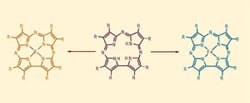Catalysts Neutralize Groundwater Contaminants
Researchers at The Johns Hopkins University, Baltimore, have developed a set of molecules that can catalyze a variety of chemical reactions, including ones that neutralize organohalide groundwater pollutants.
Some of the molecules being investigated by researchers can be used to make specialty chemicals and pharmaceuticals. The group also is focusing on how to use the new catalysts to render organohalide groundwater pollutants harmless by way of a simple chemical reaction.
“Organohalides can be transformed into safer compounds by breaking the bonds between the halogen and carbon atoms they contain,” says David P. Goldberg, associate professor for the Department of Chemistry at Johns Hopkins University. “Though this work represents a step forward, there is still an enormous amount of work to be done, including finding what metals work best under what conditions.”
In the biological world, enzymes catalyze cell function. Many enzymes have a metal molecule held inside a specially built structure; these types of molecules are called porphyrins. Using them as a model, Goldberg’s team synthesized a molecular variation, thereby changing the properties of the reactive metal in the center of the molecule.
Molecule Mimics Enzyme“Organohalides comprise a high percentage of the priority pollutants as registered by the EPA, so this is a pretty important advance,” Goldberg says. “Our molecules have the potential to catalyze a number of other reactions important in the synthesis of specialty chemicals for industry.”

